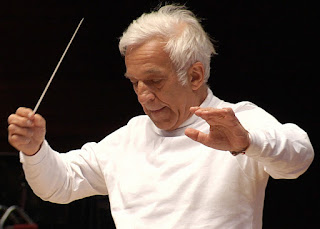It's safe to say that 2010 has reunited me with my childhood classical musician-heros: Emmanuel Ax, Gil Shaham, and then last Sunday, Vladmir Ashkenazy. Now, correct me if I'm wrong, but I daresay there wouldn't be a single opportunity anywhere in the United States to watch Ashkenazy in concert (granted, he was conducting rather than performing himself) for less than $20. But on Sunday, I was fortunate enough to watch him do just that for £10. Look, when it comes down to it, I wouldn't mind paying £30, £40, even £50 to watch Ashkenazy work his magic. It's worth it. It just so happened that this particular concert, in the newly refurbished (which delighted in its sparkling and bright infancy) Amaryllis Fleming Concert Hall of the Royal College of Music was sold out, but John and I had been lucky enough (due to our wonderful neighbors downstairs who purchased the tickets for us) to nab two seats.
Like Ax and Shaham, I grew up listening to Ashkenazy. He, along with Evgeny Kissin, were my particular favorites primarily because of their Chopin recordings, which I listened to on endless loops in my room by myself (loner, much?). Of course, Kissin appealed to me because of his looks and age (at the time, at least) whereas Ashkenazy, like Ax, was more akin to a trusted and wise grandfather - the David Attenborough of pianistic performance. So I listened to Kissin when I wanted passion and Ashkenazy when I wanted advice.
Sunday's concert consisted of two of my favorite pieces: the Schumann Piano Concerto in A minor op. 54 and the Brahms Symphony No. 1. I'd never played the Schumann myself, but as it is often paired with the Grieg piano concerto (of which I studied and played the first movement for a competition) on recordings, I became quite familiar with it. The soloist was Sofya Gulyak, winner of several prestigious awards, most recently, first prize and the Princess Mary Gold Medal at the Leeds International Pianoforte Competition. Technically, she was flawless, but unfortunately I didn't find anything particularly exciting or inspiring about her playing and she was often overpowered by the orchestra - not in the sense of volume, but by, perhaps unwittingly, their own agility and flair. I focused my attention on and became decidedly distracted instead, by the concertmistress of the symphony orchestra, who was not only enviably and extremely gifted but devastatingly beautiful. I never thought it was fair - musicians like Anne-Sophie Mutter, et al, to have beauty, brains and talent.
With the concerto out of the way (I'm so harsh - it's not that I didn't enjoy her performance, I just found it ... a little ... formulaic), I turned my attention to the Brahms symphony, which I hadn't heard since I was very small. In fact, it sounded so unfamiliar to me that until the ever-popular theme of the fourth movement occurred, I hadn't realized it was a symphony I'd heard before, so one could say that it's a "revived" favorite of mine. This was the orchestra's opportunity to shine and they surely did just that: Ashkenazy, with his white tufts of hair and slight stature, would repeatedly and broadly smile at the section he was harnessing (I use the word "harness" because I'm sure, given free reign, that they would have ran off like a wild horse - so free, spirited and fiery was this orchestra!), certain of their maturity, their talent and prowess. LPO and LSO take note: these are the young musicians of the future and musically, they are so much better than you. For one thing, their ensemble is perfect. I've been to concerts where the LPO and LSO were so embarrassingly out of sync, I literally put my head in my hands. For a professional orchestra to play so poorly is abominable. And for students to show them up? Well, I wouldn't say it's surprising, but it sure is worse.
There were so many beautiful points in the Brahms that I developed goosebumps, which John mistook for chill and tried to remedy - but it wasn't the air conditioning in the hall that was making me shiver, rather the undeniable passion these students put into the symphony. You could feel the excitement in the air, hovering there between notes - it was electric, like the charge in the atmosphere before a storm. Ashkenazy obviously had a strong influence on this electric feel - in fact, when the glorious first and fourth movements swelled to their greatest crescendos, I was, I'm ashamed to say, nervous for his health.
Overall, it was a real gem of a concert to attend and again, I do sometimes feel it's far more exciting and fun to watch and hear young musicians perform rather than professional orchestras - the RCM symphony orchestra sure gave them all a run for their money.


No comments
Post a Comment